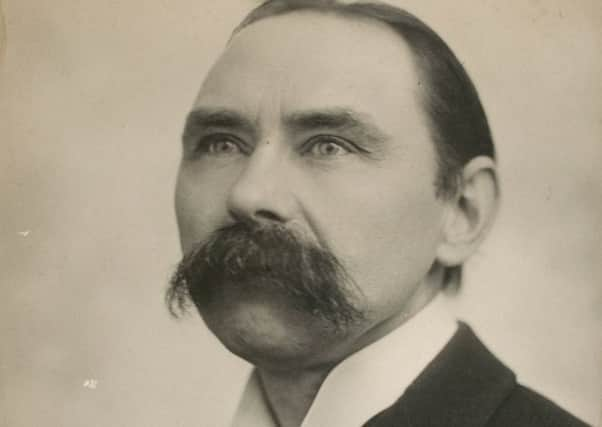Far from being anti-English, Hyde was proud of his Anglo-Irish roots


The analysis of Douglas Hyde’s character and Hyde’s approach to the Irish language is misconstrued — to such a degree that it will not be out of order to call it a grotesque caricature of this learned and gentle Protestant soul; examples are that “Douglas was fiercely anti-English”, “He (Hyde) also favoured violent insurrection...” , and “Culturally, Hyde ... failed to stem ...the filthy Anglo-American tide.”
Far from being anti-English, Douglas Hyde was proud of his Anglo-Irish roots.
Advertisement
Hide AdAdvertisement
Hide AdDouglas Hyde’s Anglo ancestry stretches back to Arthur Hyde who received a grant of land in Munster from Queen Elizabeth. The family prospered and built the fine house of Castle Hyde (the house was purchased in more recent times by Michael Flatley, of Lord of the Dance fame).


One of the Hyde family, also called Arthur, took holy orders in the established church and became an ancestor in a line of Church of Ireland clergymen, all called Arthur.
The fourth and last of whom was the father of Douglas Hyde. Hyde went to Trinity College in Dublin also with a view to taking holy orders, and entered the Divinity School, where he won the Elrington award and passed the examination for a Bachelor of Theology.
However, the hostile attitude to the Irish language, and things Irish, which Hyde had experienced in Trinity College in Dublin, motivated him to forgo a religious vocation and, instead, devote his life and considerable talents to saving the Irish language.
Advertisement
Hide AdAdvertisement
Hide AdHyde of course loved the English language. He took the Moderatorship course in English Literature and won the large gold medal (first of a first class honours) in 1884.
He also won the Vice-Chancellor’s prize for English verse. He also took the degree of Doctor of Laws.
As well as Irish, Hyde had expertise in many languages.
For instance, A Mr Crook, who was a classical scholar in Trinity College, when Hyde was a student, wrote an account of a conversation he had with Hyde: “You do know a lot of languages, Hyde. How many do you know? English, German, Hebrew, Latin, Greek and French, I suppose. ‘Yes, I can read Italian; but the language I know best is Irish. ... I dream in Irish.’”
Finally, in the winter of 1892, the year before the Gaelic league was founded, Hyde delivered a lecture to the National Literary Society, of which he was President, which is especially interesting as expressing his views at the very beginning of his great campaign for the revival of Irish.
Advertisement
Hide AdAdvertisement
Hide AdHyde spoke thus: “When we speak of the necessity for de-anglicising the Irish nation we mean it, not as a protest against imitating what is best in the English people, for that would be absurd, but rather to show the folly of neglecting what is Irish ...”
It is a calumny to suggest that Hyde favoured violent insurrection. Hyde did his utmost to keep himself and his work for Irish well away from politics.
For example, John Redmond, the leader of the Irish Parliamentary party in Westminster, publically asked Hyde at a St Patrick’s day dinner in London in 1904, to take a seat in Parliament.
Hyde declined the offer saying that in order to keep the Gaelic League outside of politics, if he accepted the offer, he would have to resign the Presidency of the Gaelic League.
Advertisement
Hide AdAdvertisement
Hide AdOn other occasions he bravely struggled to keep the Gaelic League free from politics. For instance, in 1913 he threatened to resign if political forces infiltrated the Gaelic League. However, the tide of events were becoming too strong — Cathal Brugha approached Hyde to try to get him to support the Irish revolutionaries with an offer of leadership in the political movement.
Again, Hyde refused, pointing out that he had never been a politician in the ordinary sense of the word.
In 1915 a resolution was passed entangling the Gaelic League in the independence movement. Hyde immediately protested and resigned as President of the Gaelic League.
Hyde had a great love and respect for the peoples of the English speaking world. For example, after graduating from Trinity College, Hyde went to Canada to lecture on English literature in the State University of New Brunswick.
Advertisement
Hide AdAdvertisement
Hide AdHe loved the country and wrote a poem about it ie part of a verse runs: “Yet I pine for her mighty embraces. In the home of the moose and the seal.”
He made a study of the indigenous Canadian peoples, especially the Melicite Indians. Hyde, accompanied by his lovely wife Lucy Kurtz, (whose father, Charles, left Odessa in Russia, when young, and came to England in 1815) toured the US in 1905 to promote and raise money for the Gaelic League.
The tour was a great success and the US people were very generous; the Hydes garnered about £12,000 for the Gaelic League. Sadly, when Hyde and his wife, Lucy, reached New York a terrible earthquake struck San Francisco.
Hyde obtained permission from the Gaelic League to give $5,000 to the San Francisco relief fund.
Micheal O’Cathail, Fermanagh